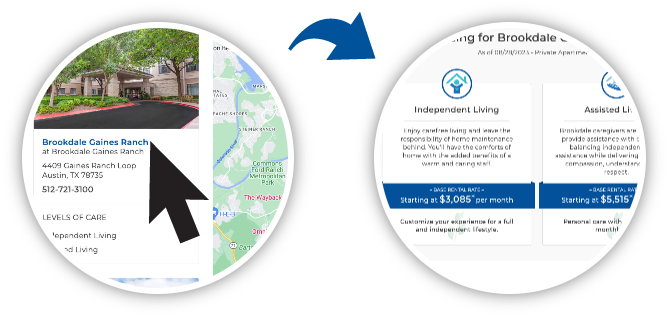- Home
- Healthcare Professional Referrals
- Blogs
- It’s Time for Senior Living to Embrace Value-Based Care
Senior living operators find themselves at a crossroads. Do we stick to what we know and provide housing and social activities? Do we help residents manage their conditions?
For many senior living operators, actually leaning into healthcare is a foreign concept. They provide senior housing and that’s it. Unlike others in the healthcare space, senior living operators have historically not been required to manage the health conditions of their residents or incentivized to implement value-based care models—but they should. The Centers for Medicare & Medicaid Services (CMS) wants to have all Medicare beneficiaries enrolled in accountable, value-based care programs by 2030. Senior living operators should pay close attention to this goal and understand the benefits of implementing a value-based care model in their communities, as adopting a value-based care delivery model is a strategic approach that can yield benefits for senior living operators, residents and providers.
Key Components of Value-Based Care Delivery Model in Senior Living
Unlike the traditional fee-for-service model, value-based models incentivize providers who prioritize patient outcomes, preventive measures and the coordination of care.
Prioritizing care coordination, managing health conditions and helping residents achieve optimal health—all aspects of value-based care—are ways senior living operators can enhance their goal of improving the physical, emotional and mental well-being of residents. However, because value-based care (VBC) is not mandatory or a regulatory requirement for senior living communities, adopting a VBC model may vary among operators. I do believe, though, that there are five key aspects of value-based care that should be integrated into a senior living community’s approach in order to be successful:
- Preventive care: By managing and facilitating care, communities help residents better maintain their overall well-being, while potential health issues may be detected early. Embracing preventive care encourages compliance with care plans and wards off potential urgent care needs and exacerbated acute care visits.
- Chronic condition management: Actively managing chronic conditions can help avoid unnecessary emergency department visits and hospitalizations. Enabling access to evidence-based clinical pathways for specific chronic conditions helps clinical staff provide timely response to any change in condition.
- Care coordination: Partnering with value-based physicians, hospitals and other healthcare professionals helps facilitate resident care, and that coordination of care is seamless, helping to reduce care fragmentation.
- Holistic approach: Care should focus on the whole person—including medical, social, emotional and mental needs. Programs and activities at the community should be designed to encourage social interaction, provide emotional support and promote cognitive stimulation.
- Staff training and education: Senior living communities should have a culture of continuous improvement in care delivery and education. Staff should be trained in evidence-based practices and kept abreast on new developments that will help them be more effective at their jobs.
How Brookdale Is Leading the Transformation With Value-Based Care Adoption
At Brookdale Senior Living, our No. 1 priority is the health and well-being of our residents, which includes helping them live their best life as long as possible. That means helping them manage their healthcare. We do this through our Brookdale HealthPlus® program—a purposefully disruptive value-based care delivery model that combines traditional elements of senior living with enhanced care management.
We launched Brookdale HealthPlus in 2020, starting with 15 communities in Ohio. From there, we added our 16th community in Ohio and then, in 2023, expanded to Texas with 15 communities and Florida with 18 communities. We rebuilt, from the ground up, the way a community operates clinically, reimagining policies, protocols, culture and systems. Since then, we have continued to refine and expand the Brookdale HealthPlus program. This year, we plan to launch Brookdale HealthPlus in 80 more communities—our largest simultaneous expansion. We anticipate this program to be in 129 of our communities, across six states, by the end of 2024. This program comes at no extra cost to our residents—it is all part of the way we bring more value to them. Brookdale HealthPlus is designed to address the unique needs of senior citizens with complex medical conditions in three ways:
- Managing chronic conditions: We bring healthcare to the residents living in Brookdale HealthPlus communities. We use evidence-based nursing protocols to help residents manage chronic conditions by providing prompt notifications of changes in conditions and by working with residents’ medical providers. Our goal is to avoid unnecessary emergency department visits and hospitalizations—and we have the data to show this approach works. Our Brookdale HealthPlus residents have 78% fewer urgent care visits and 36% fewer hospitalizations than individuals living in private homes*.
- Care coordination: A RN Care Manager serves as an advocate for residents and helps plan and manage care transitions. Navigating the healthcare system can be complicated. Research from hospitals that prioritize care coordination shows a positive influence on patient experience. We have seen this to be true, as well. When residents feel supported by our staff in their medical care and have an advocate, their experience is greatly improved.
- Preventive care: We develop comprehensive care plans with the resident’s primary care provider to include diagnoses, physician and nursing orders, medication management and preventive services, such as annual wellness visits, vaccine clinics and health screenings. Brookdale HealthPlus residents have a 63% higher annual wellness visit completion rate than individuals living in private homes*.
RN Care Managers serve as an advocate for our residents to help plan care and manage care transitions, including coordinating communication between providers, reconciling medications and scheduling follow-up visits with physicians. They use our EHR to closely manage residents’ health conditions and real time access to care plans and physician and nursing orders.
We see value in adopting this program because it helps keep our residents healthier and happier longer, which is ultimately the right thing to do.
* Source: Internal Brookdale data; 2019 Medicare Current Beneficiary Survey (MCBS)
Kim Elliott joined Brookdale in July 2014 and has served as our Senior Vice President and Chief Nursing Officer since August 2021. Elliott has more than 27 years of experience in senior living and has developed a care philosophy based on the importance of individualized care, personal choice and resident independence. Elliott received a BSN in nursing from the University of Kentucky and a master’s degree in nursing with a nursing executive specialty from Chamberlain University.
Categories
- Alzheimer's & Dementia
- Caregiver's Corner
- COVID-19
- Health, Safety and Wellness
- Financial Well-Being
- Passion & Purpose
- The Journey to Senior Living
- Trending Now
- Socialization & Relationships
- Brookdale Solutions
- Brookdale Vision and Growth
Archives
View All
- November 2025
- October 2025
- September 2025
- August 2025
- July 2025
- June 2025
- May 2025
- April 2025
- March 2025
- February 2025
- January 2025
- December 2024
X
Let us help find the right community for you!
Complete the form and a Senior Living Advisor will be in touch!


